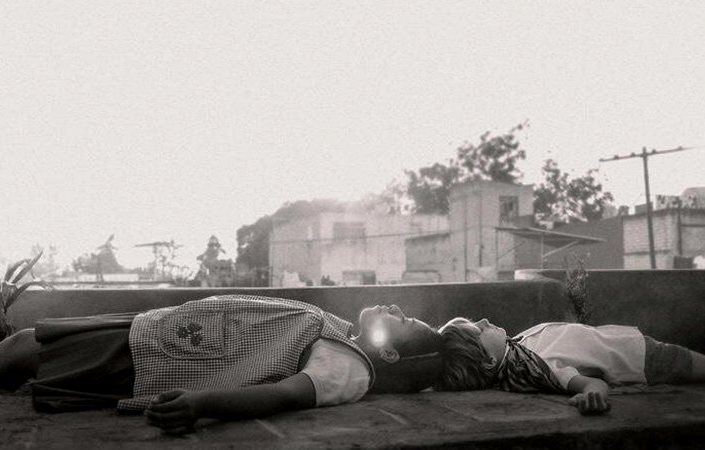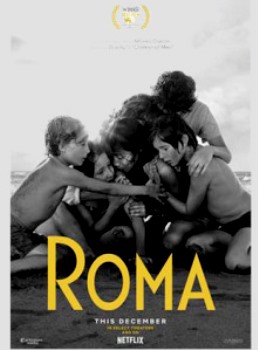
The shimmering but oversaturated white glare cinematography is what beckons attention – it screams ART. Beneath the look of the film, there’s a little something there, very little, in what should be looked at as a personal little ditty for director Alfonso Cuaron (“Gravity”). The main character of Roma (Mexico, in English subtitles) is a servant for a wealthy Mexico City family in the early 1970’s, and it’s apparent that she not only cleans the house, but is the family glue. Her name is Cleo (Yalitza Aparicio), very meek and soft-spoken, demands little, is dutiful, and is absent of offering any unsolicited opinion. In her off hours, she sees a boy, and that sours immediately after she tells him she’s pregnant. The family she works for also has its ups and downs. And Mexico itself is going into its own political tailspin. What that is exactly is, what the Corpus Christi massacre was about, is disappointingly vague and all background noise.
At its best, “Roma” has a sprawling, slice of life aesthetic, but I never responded to it as a cohesive story. Yet it’s no secret how many people, in advance of its release, have adored the film already. I couldn’t help but watch it in the vein that this is a wildly overpraised film. And I honest to God willingly admired it at times, and got a little something out of it. I looked at it curiously like I would at a fleeting museum exhibit, in glances here and there. Or perhaps it’s like a coffee table book where you skim the pages and occasionally something interesting jumps out at you for a moment in-between the soporific.
But damn the delirious overpraise this little ditty is stirring. Some viewers might find it so miraculous that a film would give textured life to yesteryear Mexico and grant us closeness to a common servant who loves the family she works for, just like many around the world still do today. But as real as she is, Cleo is not a compelling character. There is nothing intellectually enthralling to gain from her.
There are house servants in this world that are talkative, that are reeled in as part of the collective family, and are glad to be there (would this family be more “humane” if it gave Cleo a severance package and told to hit the streets?) It’s of course valid to make a film about someone as insignificant and transparent as her. But there’s got to be a limit to how connected you could possibly feel about Cleo at the end of the day. There’s not much too her. If you met her in real life, a talk with her would last about five minutes and then you would run out of things to say.
“Roma” raised some awareness for me in what the life of Mexico proletariat looks like, but still it kept me at arm’s length. It should be said I’m glad that I saw it, but it’s silly to me to think that anyone thinks there is anything great going on here.
I can handle someone saying the film is a persuasive portrait. I can handle someone saying it is good. But I hate to break this to you: If you think this is the best film of the year, you’re insane. Sorry, I do know how to break it to you. You need to get out more often if that’s the case and not watch movies, but live life.
135 Minutes. Rated R. Spanish in English subtitles.
FOREIGN FILM / ADULT ORIENTATION / AFTERNOON FOOD FOR THOUGHT
Film Cousins: “Diary of a Chambermaid” (1964, Spain); “Tristana” (1970, Spain); “Chocolat” (1988, France); “Y Tu Mama Tambien” (2001, Mexico).





